| Srl | Item |
| 1 |
ID:
165668
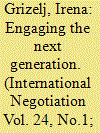

|
|
|
|
|
| Summary/Abstract |
Literature examining the participation of youth during peace processes is limited. Previous work has often focused on youth as “peacebuilders” and agents of change or threats to peace in the post-accord period, with little emphasis on how young people participate during the negotiation phase. This article seeks to fill this gap by assessing youth inclusion and participation in Myanmar’s ongoing peace negotiations. The study finds that, while youth have not had formal inclusion avenues in the peace negotiations, there are cohorts of young people who perceive themselves to be legitimate stakeholders in the peace process, who have attempted to gain access to decision-making in the peace negotiations, and have played active roles in supporting the process. It is argued that recognizing youth as key stakeholders in the peace accord will play a vital role in building sustainable peace within Myanmar’s nascent democracy.
|
|
|
|
|
|
|
|
|
|
|
|
|
|
|
|
| 2 |
ID:
181623


|
|
|
|
|
| Summary/Abstract |
Since the dawn of the twenty-first century, the Horn of Africa has undergone significant change. Presence of extra-regional powers has transformed the region into a strategic pivot of the Indian Ocean. But fractured societies of the region are in acute need of sustainable peace. Curiously, India’s engagements with the Horn have been confined to peacekeeping operations and anti-piracy patrols. As a member of the United Nations Security Council in 2021 and 2022, India could do more. Against this backdrop, this article examines the salience of the Horn of Africa as a strategic pivot. It assesses the challenges and opportunities for engaging a region that is steeped in geopolitics but yearns for sustainable peace. It seeks to develop a framework for India’s engagement in the Horn of Africa by evaluating the complementarities between the United Nations agenda of sustaining-peace and India’s vision of Security and Growth for All in the Region.
|
|
|
|
|
|
|
|
|
|
|
|
|
|
|
|
| 3 |
ID:
104600


|
|
|
| 4 |
ID:
099152
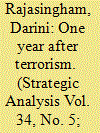

|
|
|
| 5 |
ID:
145442
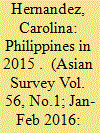

|
|
|
|
|
| Summary/Abstract |
Other than the South China Sea (SCS) disputes, the Philippines in 2015 faced the same conditions as in 1996: keeping a sustainable peace in Mindanao, presidential elections, and a promising economy. The year was capped by the country’s hosting of the Asia Pacific Economic Cooperation (APEC) Summit. Chinese assertiveness challenged ASEAN’s unity and made closer Philippine ties to Washington and Tokyo an imperative.
|
|
|
|
|
|
|
|
|
|
|
|
|
|
|
|
| 6 |
ID:
120222
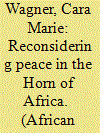

|
|
|
|
|
| Publication |
2013.
|
| Summary/Abstract |
After only ten years in existence, the African Union (AU) has already made its mark on the landscape of peace and security in Africa. This paper seeks to explore the relationship between the AU's leading collaborative interstate security policy, the African Peace and Security Architecture (APSA), and sustainable peace in the Horn of Africa. It examines four countries - Djibouti, Eritrea, Ethiopia, and Kenya - and how engaging with the APSA through early warning systems can contribute to developing the elements necessary for sustainable peace, namely regional stability, conflict management, and good governance.
|
|
|
|
|
|
|
|
|
|
|
|
|
|
|
|
| 7 |
ID:
137189
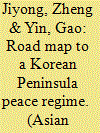

|
|
|
|
|
| Summary/Abstract |
Sustainable peace and stability need an institutional guarantee. Based on the unique logic of its Korean peninsula policy, China has sketched a Chinese-style Korean Peninsula Peace Regime that comprises logic positioning, strategic objectives and priorities, a mechanism, a timetable, and a road map. The basic logic of the peace regime, the aim of which is long-term peace and stability on the Korean peninsula, is that it should include security but also integrate security with economy and culture.
|
|
|
|
|
|
|
|
|
|
|
|
|
|
|
|
| 8 |
ID:
097671
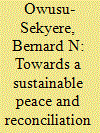

|
|
|
|
|
| Publication |
2009.
|
| Summary/Abstract |
The article begins with a profile of the Ivorian civil war which remains at management
stage pending the result of a successful democratic election to seal the various agreements
signed between the government and the rebel parties. Taking examples from West Africa,
a case is presented for constituting and pursuing a reconciliatory process that deals with
the hurts and harms arising from human right abuse and extra-judicial killings by both
the state army and rebel forces. Reconciliation processes in Latin America and sub-
Saharan Africa are examined and a truth and reconciliation commission is proposed for
Côte d'Ivoire.
|
|
|
|
|
|
|
|
|
|
|
|
|
|
|
|
| 9 |
ID:
176606
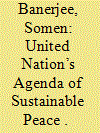

|
|
|
|
|
| Summary/Abstract |
Two decades into the twentieth century, traditional interstate conflicts
continue to persist. However, peace and security are no longer
measured only in terms of conventional wars. Under-development in
many parts of the globe manifests itself in crime, terrorism, and civil
wars which, invariably, have a transnational character, and affect
regional stability. In 2016, the United Nations Security Council and
the General Assembly adopted concurrent resolutions on Sustainable
Peace, recognising that development, peace, and security are firmly
interlinked. In 2015, Prime Minister Modi enunciated India’s foreign
policy vision of Security and Growth for all in the Region (SAGAR)
that conflates security with development. This paper seeks to access
the extent to which the United Nations has been able to deliver on its
sustainable peace agenda. It examines the conceptual compatibility
between sustainable peace and SAGAR. Finally, the essay argues
that SAGAR not only provides a framework for maritime governance
in the Indian Ocean but is also a strategy for sustainable peace with
a global footprint.
|
|
|
|
|
|
|
|
|
|
|
|
|
|
|
|